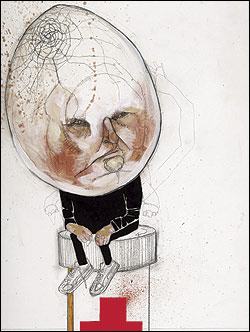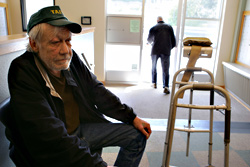He was in the hospital the day he learned he had been elected to the Phi Beta Kappa Society. Rodney Plamondon looked for a while at the letter that told him this. He was pleased. He was the 22-year-old son of a long-haul truck driver. Rodney’s future wouldn’t involve driving a Kenworth.
This was good. He had dreams. He had aspirations of doing graduate work in the classics at an Ivy League school, of teaching after that. Or entering the Foreign Service. Getting into that honorary society wouldn’t hurt his chances at either.
Rodney put the letter away. He had more pressing concerns.
He was, on this July 1984 day, in the psychiatric unit of a hospital in Boise, Idaho, his hometown. He was newly diagnosed as a paranoid schizophrenic. Rodney hadn’t the slightest idea what this diagnosis meant for his world, but he knew that his life had changed dramatically.
“I asked the doctor if I would get better,” Rodney says. “‘Oh, it gets worse as you get older,’ is what he said. Nice pat on the back.”
It happened to me that way, too— a psychotic break out of the blue during a twentysomething life that had been shaping up quite nicely. It was difficult to build a new life out of that. There were many, many setbacks. That’s the absurd deal of mental illness: You get taken most commonly in your youth, when life is just beginning to gel. You get an illness that, in many cases, is so disabling that it strips you of the psychological and practical goods essential to a decent existence. Often you get kicked right out of the mainstream, no matter how solid a citizen you were before it all went bad.
What are you going to do about that?
You have three choices: kill yourself, lead a featureless existence, or fight back and extract some measure of revenge on that which laid you low. Rodney and I rejected options one and two. Option three is no cakewalk. It takes years of determined effort before you see light at the end of the tunnel, and as you feel your way along, you’ve got to do it all on blind faith that something good might happen. After 15 years, I’m finally beginning to see a faint glow.
Rodney is still staring at the dark walls of the tunnel. In the past year, he’s been in and out of psych units in Seattle eight times. He’s lost pretty much everything—his furniture, his computer, his cat, and every scrap of fiction and poetry he had written over the past 20 years. He takes Haldol and Clozaril twice a day—powerful antipsychotics. Rodney sleeps 12 hours a day on average, sometimes 15. On his left cheek, there are flakes of skin where the pillowcase has rubbed him.
Some days, when he leaves the building, he looks as though he’s been mugged and beaten. Those are his good days. Other times, the bad days, he’s too paranoid to step outside. He’s still warming up to fighting back.
“I keep thinking I’m going to get better,” he says. “I’ve been thinking that for 20 years.”
I’ve been thinking, too. I’ve been thinking that in the past two decades, we’ve come a long way in how we regard the mentally ill. You can, for example, mention schizophrenia in mixed company these days without causing half the people within earshot to gasp or cross themselves. But we’ve not advanced far enough. We haven’t reintegrated people like Rodney into American life, except in the most marginal of ways.
I’m thinking we can do a lot better than that.
All This Torment, and No Sex
The central question before people with chronic mental illness, such as Rodney and me and the millions of other Americans who’ve got it bad, is this: Can you get to where you were before all hell broke loose in your brain and soul and life, before disorder became the order of the day? Can you be whole again? It’s the only question worth asking. The answer is that many of even the most chronic sufferers can get much of their life back. They can have homes and jobs and careers and cars and families. Rodney can, too.
Paradoxically, the medications designed to get people like Rodney off the deck and able to reintegrate into society often limit the kind of life they can have. They are an effective baseline treatment. For some with lighter varieties of mental illness, medications are a gateway to a better life. But for many others, medications are as much a curse as a cure. Just ask Rodney. As he looks forward to a day when he’s stable again, he’d like to have a girlfriend, for one thing. The trouble is that the meds that work for him render him impotent.
“A caseworker once told me that you didn’t need to have sex to have a relationship,” he says. “I laughed at him.”
Over the past 15 years, the dominant paradigm for treating mental illnesses in America has been to use new-generation psychiatric medications and rely on them almost completely. It’s a kinder approach to helping the mentally ill than the days of institutionalization, to be sure, and it has enabled millions of Americans with mental illness to realize better lives than in the 1970s. But for millions more, the approach isn’t all that gentle. The meds can have debilitating side effects—cognitive and physical. It’s Russian roulette when you take an antipsychotic, and it’s Russian roulette if you don’t.
Many of us who live with mental illness— patients, clients, consumers, whatever you want to call us—have come to realize that meds alone get us only going half the distance. They treat the chemical imbalance in the brain, but they don’t help the human being connected to the brain as much as casual observers and many professionals think. Meds often leave the human being behind.
That complicates an already complicated situation for someone like Rodney. It’s not like he doesn’t have enough obstacles. You know the kind of social stigma that follows a man or woman who’s been in a psych unit a few times and gobbles antipsychotics, mood stabilizers, and antidepressants as if they were Smarties.
They’ve fallen. They won’t ever get up. Tilt. Game over. Families disown them. Lovers leave them. Employers fire them. Friends peel away. We demand that they get jacked up on meds and leave, to handle the detritus of their lives. They get worse, they stabilize, they get worse all over again.
We fully expect people like these to take their medications, stabilize, and march right back into American life as if what they went through were a bump in the road. Living with a serious mental illness is more complicated than that, of course. It takes years to find a way around that big a bump, and there are more obstacles than just a brain that’s somehow gone wrong.
Try explaining to a date or a potential employer, for example, what your deal is. Tell them why you got into your 40s without marrying, why there’s a five-year gap in your job history, why waking up at 8 a.m. just isn’t an option if you must take an antipsychotic the night before. Level with them. That’s a conversation that’s over before the words are out of your mouth. You are a freak, kind of scary, a human beast given a wide berth.
Rodney knows the drill, as do I. Across our adult lives, we’ve both been adrift in the backwash of America’s social assumptions. Our response has been to play by the rules. We’ve unscrewed the amber-colored pill bottles and taken our medicine. We’ve sucked up the shame associated with having a mental illness. We’ve taken intricate steps to keep ourselves alive—Rodney bolting windows shut to keep him from jumping, for example—and battled the nastiest of the demons. We’ve never stopped trying. We’d both be dead by now if we had.
Exorcism Doesn’t Work
Rodney was born in Boise in 1961. During his youth, he played baseball and backpacked with his family in the mountains of central Idaho. He did well in school and better at baseball and went to the University of New Mexico in Albuquerque.
Confident of his abilities as a shortstop, he tried out for the university’s baseball team as a walk-on. Out of 36 who tried out, he was one of four to make the team. Rodney saw no playing time, though. He knew he’d have zero chance of being one day drafted into the major-league farm system.
He transferred to the University of Idaho in Moscow, where he majored in the classics and minored in literature. He mastered classical Latin and could translate Virgil and Cicero. Later, he became adept at Attic Greek, the language of Socrates and Sophocles. As he neared the end of his undergraduate years, in early 1984, he hoped to do graduate work in the classics at Brown University in Rhode Island and go on to teach. He kept practice copies of the Foreign Service exam in his apartment.
Then came his big psychotic break. Rodney was supposed to drive south to Boise and visit his parents one weekend that January. Instead, he started hearing voices. Bad ones. He got in his car and drove north to Lake Coeur d’Alene. It was 10 below zero. Rodney dived off a dock, into the water, fully clothed. His car keys were lost in the water.
That summer, he was finally hospitalized. After his release, Rodney’s mother asked a priest to perform an exorcism on him. About a year later, his father drove him to State Hospital South in Blackfoot, Idaho.
“He told me once it was the hardest thing he’d done in his life,” Rodney says. It wasn’t so easy for Rodney, either. His quarters were in a basement of the hospital. “We called it the snake pit,” he says, and leaves it at that.
He moved to Seattle in 1986. Rodney shared an apartment on Queen Anne Hill with his girlfriend. He’d swiped her from another man while they were undergrads in Moscow. A graduate student, she taught freshman language classes at the University of Washington while Rodney was trying to pull his life together. She thought their relationship would heal Rodney. He bought her a ring. They got engaged. His only income was $300 a month in federal disability payments. He took his Haldol. He slept 12 hours a day. At times, he and his fiancée decided he should back off his meds. This did not make him a prime candidate for employment, despite his smarts. What’s more, the Haldol wrecked his sex life. His fiancée left him in 1990.
Soon after, Rodney moved into a public housing project in Belltown. In six years, he’d gone from Phi Beta Kappa to low- income housing. This was not how he wanted life to turn out. He worked as a stocker at a drugstore downtown 20 hours a week. For a time, he worked as a peer provider, as they are known, at a downtown social-service agency.
“I was mostly breaking up fights,” Rodney says. He kept himself out of trouble. Downtown Seattle, like any large urban core, is a garden of temptation for the mentally ill. Often, they seek out the euphoria that their brains and psyches simply cannot supply. It is not unusual to find a schizophrenic on the business end of a crack pipe.
Rodney passed up the temptations. He barely drank alcohol. He wrote short stories and poetry about people in relationships, recalling when he was stable. He drifted like this for a decade, trying to put his life back together. He took his meds. A doctor added Depakote to his regimen. That’s an antiseizure medicine that also works as a mood stabilizer, to tamp down mania. His schizophrenia had evolved into schizo- affective disorder, a mix of bipolar disorder, also known as manic depression, and schizophrenia. He gained 60 pounds, a common side effect of Depakote.
“My doctor had me on so many meds that I’d come home from work and collapse,” he says.
Impotent and dragging 240 pounds around on a 6-foot frame was not his idea of living.
Then Rodney went off his medications. They were simply dumbing him down too much. He wanted to have a life unburdened by their effects.
It was an understandable move. A decade ago, I was dosed on 80 milligrams of Prozac and 3,000 milligrams of lithium. More typical dosages of each would be 20 milligrams of Prozac and 1,500 of lithium. I was a zombie. I could walk. I could talk. But I was barely capable of human inflection. I worked as a bookkeeper at a large middle school in San Diego. It was a crap job, a placeholder while I tried to re-create my crap life. The children were the only benefit. I was so scrambled that I couldn’t fill out a bank deposit slip without errors. I kept that to myself.
I’d go home in the afternoon and plunge into bed and sleep four hours, as drugged as if I’d swallowed a handful of Quaaludes. Later, I’d awaken for a few hours, read, eat, and go back to bed. In the morning, the school kids would tease me about my shaking hands. They insisted that I’d been drinking the night before. I didn’t dare tell them about the lithium that caused the trembling. Nor did I tell colleagues. It was 1993, and being public about mental illness with an employer was a ticket to unemployment.
None of that dissuaded me from dropping 12 capsules a day down my throat. It was a religion among psychiatrists in those days: If a patient was still having problems, give them more meds. I was an unquestioning disciple. Meds will cure you. Be a good boy. Take them. I wanted the cure. I wanted my life back. I wanted revenge. I never missed a dose. Otherwise, I figured I’d either wind up in a psych hospital for a long spell or turn up dead.
Still, I can understand why Rodney went off his meds last fall. The meds made me fat. They made me sleepy at work. They are about as much fun as a neutron bomb. For a time, he felt great. Soon, he was inviting street people into his apartment. They stole his furniture and computer.
Then, last November, he decompensated— a clinical term meaning he crashed and burned. He was in and out of the psych units at Harborview Medical Center and Highline West Seattle Mental Health Center several times. When he wasn’t in a hospital, he was on and off his meds.
And then one night last April, Rodney touched off the fire alarm in his building. This time, police came for him. He was hospitalized at Harborview. While there, he was evicted from his apartment. The building’s management turned his cat over to the pound. Sheriff’s deputies threw two decades of his writing and his Phi Beta Kappa key into a dumpster.
When I first met him, in the psych unit there that summer after a subsequent hospitalization (I was there in a professional capacity), Rodney looked gut-shot and pale. “I’m through fighting it this time,” he said. What he meant was that he was back on the program.
No Cure, But You Can Recover
Each Tuesday afternoon, Rodney takes a taxi from Wallingford, where he lives in what’s called a transitional housing program, to a nondescript office building on First Hill. There, he meets with his case manager, David Robinson, a social worker at Harborview. He’s been working with tough cases such as Rodney for three decades. Patients who go on and off their meds. Patients who spend part of their disability check on crack. The meeting isn’t a therapy session, and he doesn’t prescribe meds.
Like others in the profession, Robinson realizes that the patients who do well, who recover enough to re-evolve their lives, have a simple yearning. “‘I want my life to be normal,'” he says. “That’s where they’ve got to be. There’s always got to be a baseline of hope in how you view life.”
But after such damage to your brain and psyche, how do you get your life back, much less your hope?
One approach being adopted in mental-health circles, principally at progressive places like Harborview that cater to the most extreme cases, is to view these people through the lens of recovery. The term, borrowed from elsewhere in the medical world, describes a state of mind, a way of living and being, of relating to an often-unreceptive world—not striving for complete elimination of a disease.
You can get better, but only if you think you can. You can have a life, but only if you want it.
It’s an attempt to address the whole human being, not just receptors in the brain. Get someone consistent housing and some level of emotional support from family and friends. Get them a job. Good things will follow. A life with some roundness to it will emerge—and such support is as therapeutic as anything you can get from a pharmacy.
Mental illness, you see, creates much more than a medical problem. It tosses people into an existential crisis. Your life has changed dramatically and suddenly and for the worse. You were calm before, now you are wild and unpredictable. It wasn’t your doing. It was a quirk of nature, a twist of fate. You feel truly screwed. How will you extract some meaning from something so absurd?
You will stay awake at night and gnaw on that problem, probably for years. You’ll likely struggle with some level of suicidal tendency. You’re broke, mentally, physically, and financially. Some in your family and circle of friends have cut off contact. Rodney hears from his father perhaps once a year, usually by letter (his mother died in 1987). You wind up hating yourself because these consequences seem thoroughly logical.
What makes things dicey is that what you’ve got is episodic. You can take your meds and keep appointments with every doctor and social worker under the sun and yet, nine months later, bam, here comes another round of mania. Hello, locked psych unit. Goodbye, job and apartment. Stabilize. Repeat.
I was beset by the same cycles during my 20s and 30s. Meds followed meds, 16 in all. Breakdowns followed breakdowns. Nothing seemed to work for very long. I lost jobs at a healthy clip.
Amidst this whirl of disorder, I learned three crucial things. One, I wasn’t going to kill myself. Second, I had far more power over my fate than any doctor ever let on. Third, the existentialists weren’t joking: The world is truly absurd.
I’d like to claim that one night I was visited with a revelation about how to grapple with this. It was a far lengthier process.
It boiled down to this: I decided that my life, as I had known it, was over. I was never going to get back to the job I had when I was 25 years old, making $65,000. I was never going to get married and father children. It was time to put a fork in those dreams—I couldn’t reclaim them. That me was dead and done, and I was reconciled to that.
That kind of truth will set you free. It will free you to take the kind of risks you’d never take if you were trying to realign yourself with the life you once lived and the goals that once got you out of bed each morning.
Also, it freed me to be pushier with my doctors about what meds and how many of them I would take. I couldn’t, for example, tolerate the amount of sleeping caused by antidepressants. My doctor reacted as if no patient had ever bossed him around before.
“But you’ll have problems,” he said.
I pointed out that after more than a decade of taking meds, I still had severe bouts of depression. The meds hadn’t stopped that. I told him that in getting rid of the side effects of antidepressants, there was a certain amount of depression I was willing to accept.
“I cannot approve of this, of course,” he said.
A Soul Under Siege
One afternoon in October, Rodney and I walked to Gasworks Park. The wind off Lake Union was raw and cold. We leaned against one of the old compressors. He’d been out of Harborview two months, was taking his meds. He looked played out.
“People can read my mind,” he said. “They can read my thoughts, and they know what I’m going to say before I can say it. I have no privacy.”
Rodney wasn’t doing well. He was beset by paranoia and, as a result, free-floating panic attacks. There is a constant sense that you are a prisoner to everyone around you, that everyone is looking for a way to tighten your leg irons. You just can’t be anywhere near other humans for days or weeks at a time. You can barely drag yourself to the corner market to buy cigarettes or food. You can’t sit in a restaurant. If you are smart, you will not get behind the wheel of a car.
It sounds abstract, of course, but I can assure you that it’s very real. When I get my semiannual visits of depression, I can’t leave my apartment for days at a time. I can’t listen to music of any kind. It all becomes grating and metallic—not even Mozart can punch through that mental pea soup.
This is the kind of serious business that meds cannot protect you from. It’s like your soul is under attack. There’s no medication to fix that.
Talking to Rodney about recovery, under the circumstances, would have been cruel.
I asked him about his past. What Latin did he remember?
“I don’t remember much,” he said. He leaned there and looked at the cement. A black cat wandered over from the parking lot and rubbed his legs. His face was expressionless. The week before, he’d turned 43.
I ran the first two lines of The Aeneid past him. If you’ve had much Latin, those are two lines that are impossible to forget. He turned toward me.
“That’s, that’s,” he said, and stopped. I waited for him. He said nothing more. I was desperate for the man to have an epiphany, however small, so I waited some more. Then I told him where the lines came from.
“Yeah, that’s at the beginning,” he said, and nodded.
“At the beginning of a boring book,” I said. Rodney laughed.
That was as animated as he could be most days. He couldn’t leave his room and could barely make it in a taxi to his weekly appointments at Harborview. The bus was out of the question.
“I need to go,” he said.
Would You Marry Him?
As a country, we’ve spent the past 40 years trying to figure out what to do with people like Rodney, for our sake as well as theirs.
In the 1960s, he’d have been confined at a state mental hospital. That isn’t too humane and costs a fortune, so we’ve mostly backed off that reflexive reaction to the chronically mentally ill. By the mid-1980s, people like Rodney were being pushed onto the streets. We tried to de-institutionalize them on the cheap and failed to provide housing. Oops.
But soon after, all the Prozacs and Risperdals came onto the market. They were a better deal than restraints in a state hospital or the old psych meds like Thorazine or the hazards of the streets.
And that was that, we figured. The meds are a cure, and we’re saving money by not hospitalizing these folks. Let them live among the rest of us and go to work in the morning and pay bills in the evening. Let’s get as many of them as we can off the public dime.
So what’s next for someone like Rodney, assuming he’s reasonably lucky and stabilizes? The way things are now, probably not much.
Are you going to hire him? He’s barely worked in the past five years, and frankly, the man is too smart to find much satisfaction in pushing a broom in an office building. Will your family take him in? His own family has spent the past 20 years spurning him. Want to marry him?
You know the answers.
I was unemployed several times during the early years of my illness, at one stretch for almost a year. I’d land a job. Things would be OK for a few months. I’d be stable and looking forward to each new day, convinced I was on the road to progress in life. Then the illness would reassert itself. I’d lose my job. Or I’d be so cognitively reduced that I was unable to perform the simplest tasks.
Once, I decided to be honest with an employer about what was going on and what I was up against. This was in 1993, when I worked for San Diego City Schools. It was one of the stupidest things I’ve ever done. A month later, the district, at my boss’ urging, declared me a threat to the students and tried to fire me. They had only their paranoid bureaucratic fantasies and ignorance about the illness for evidence. It took a year, but they got rid of me.
We do far too much of that in this society. Our compassion stops where the workplace starts. We toss aside thoroughly decent people over this illness. That isn’t right, nor is it smart. If things don’t change, the implicit promises that we’ve dangled before people like Rodney, of a better life, are meaningless. The time is right to get over the stigma of mental illness. So many working Americans now take antidepressants that it’s an open secret in companies large and small. I bet there isn’t a company of more than 50 employees in the Seattle area where at least one person isn’t taking psych meds.
So why does mental illness remain such a basis of discrimination? And why is it that people of power, money, and privilege who take psych meds (you know who you are) can, in turn, ignore people like Rodney when they come looking for a job?
What are we so afraid of? We’re afraid of taking a chance. What if something bad happens? Well, for that matter, what if something good happens? Something good can happen. It did for me. We can’t know unless we try. And if we don’t try, how can we expect people like Rodney to try?
Misfortune and Acceptance
Researchers keep talking about a cure for mental illness. They say that in the future Rodney will be able to take a pill once a day and kiss his mental illness goodbye, with no side effects. Others pin their hopes on gene therapy. Some of them say it will be within a decade.
That would be nice, but in light of previous cures, I’m not holding my breath. But I do think it’s reasonable to hope for a time when America accepts people who have had the misfortune of a chronic mental illness as full-blown members of society. A day when someone like Rodney Plamondon can get a job without hiding the fact that a piece of his life is missing. For Rodney and me, it would be the best revenge.
That vengeance is down the road for Rodney. Right now, he’s caught between the world of living and the world of living death.
We talked recently at a diner in Wallingford. Rodney wore jeans, a dark-blue hooded sweatshirt, and a T-shirt with an elephant charging in front of a Buddhist temple. He looked better than I’d seen him before. His eyes were alive. He wants to move to Vermont, perhaps next spring, where a friend he made during his first hospitalization in 1984 lives on a few acres abutting a hardwood forest. For the near term, his goals are smaller.
“I want to be able to ride the bus anywhere in Seattle,” he said. “I want to write again.”
How’s he going to do that when he’s awake eight hours a day, tops, so zonked by his meds?
“I don’t know,” he said. “But I’ve got to get busy.”
pdawdy@seattleweekly.com 206-467-4384








